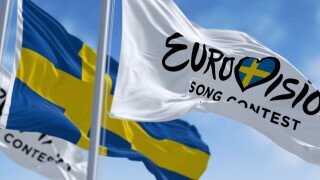A Brief History of Eurovision’s Political Messiness

The Eurovision Song Contest is mostly known as a mecca for the musically mediocre of Europe and also Australia for some reason — or, in America, as a surprisingly good Will Ferrell movie — so you wouldn’t expect it to be mired in political controversy. With that many countries all coming together and Eurovision’s ironically staunch insistence on staying out of their disputes, however, it’s bound to happen. The current criticism of Israel’s involvement is only the tip of a very weird iceberg covered in sequins and loaded with pyrotechnics.
Armenia and Azerbaijan
Armenia and Azerbaijan both entered Eurovision in the late ‘90s, which was awkward because they’ve been at war for several decades. Right off the bat, Azerbaijan got pissed that the broadcast depicted a monument in disputed territory as belonging to Armenia, censored it in their country, and “invited” some citizens who had voted for Armenia’s song to have a little chat at the Ministry of National Security. When Azerbaijan won in 2011, meaning they’d host the next year’s contest, Armenia boycotted, and in 2015, they entered a song called “Don’t Deny” about denial of the Armenian genocide, whose title they were forced to change because Azerbaijan, you know, does that and Eurovision didn’t want no fights. They got them anyway: In 2016, Armenia got in hot water for waving a controversial flag, and in 2021, Azerbaijan did for entering a performer who’d made some, uh, very patriotic statements in the past.
Georgia
It’s hard to have a song contest, especially a multicultural one, that forbids political messages. Otherwise, you’re just discoing into the void. But Eurovision has a rule that "No lyrics, speeches, gestures of a political or similar nature shall be permitted," and Georgia ran afoul of that rule in 2009 with the song “We Don’t Wanna Put In,” which “appear(ed) to poke fun at Russian Prime Minister Vladimir Putin.” Yeah, you can’t even criticize the man whose name has become synonymous with cartoonish evil. Eurovision demanded they change the lyrics, so they chose instead to peace out on the competition, which happened to have been held in Moscow. They might have literally dodged a bullet.
Ukraine
While we’re on their side here, Eurovision has a bizarre history of bending the rules for Ukraine. The 2016 winner was a song by a Ukrainian artist about the deportation of her family from Crimea by Josef Stain, so it’s apparently okay to criticize guys we all recognize as bad as long as they’re dead, though she came right out and said the song was also connected to the contemporary seizure of Crimea by Russia. In 2022, Eurovision finally bowed to the pressure to ban Russia from the competition “in light of the unprecedented crisis in Ukraine.” They denied Ukraine President Volodymyr Zelenskyy’s request to address the audience during the event, though, on the grounds that he might say something political. He probably just wanted to demand “Jaja Ding Dong,” but whatever.
Israel
Israel’s inclusion in the Eurovision Song Contest has been controversial since its first year in 1973, with some countries going so far as to pretend they don’t exist. For example, when it appeared Israel was going to win in 1978, broadcasters in Jordan cut the live feed, blaming technical difficulties, and claimed Belgium won. In 2024, petitions circulated and artists spoke up demanding that Israel be forced out of the competition due to the war with Hamas, and Eurovision had to face the fact that, since they made concessions to Ukraine, they might be expected to do so for everybody. They’ve declined to do so because this is, like, different somehow, and why can’t you just let them drop those funky beats without picking sides? You big meanies.